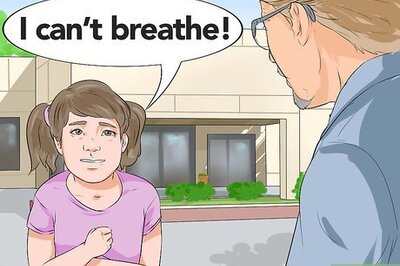
views
BOGOTA: Colombian workers and students protested against the social and economic policies of President Ivan Duque on Monday, seeking to revive mass demonstrations amid an economic crisis and recent incidents of police brutality.
A morning caravan of bicycles, motorcycles and cars to the labor ministry was organized by major unions to comply with coronavirus restrictions which mandate face masks and ban large crowds.
An afternoon gathering of hundreds in Bogota’s central Bolivar Plaza was less peaceful, with some protesters throwing rocks at police outside the seat of the country’s top courts.
Local news showed a break-in at a bank and then protesters returning a large stolen TV to the site. Police used tear gas to disperse crowds.
The death this month of a man detained and repeatedly stun-gunned by police led to nights of protests in the Bogota and satellite city Soacha that killed thirteen people, with hundreds more injured.
“I’m protesting for my rights, because it’s not fair for them to take someone’s life,” said 19-year-old student Alejandro Ortiz. “There’s so much aggression and corruption.”
Public transport will shut at 8 p.m. and Bogota’s mayor encouraged people to return home early.
Union and student leaders hope to rejuvenate widespread protests which took place late last year. Isolated looting led to the first curfew declarations in a generation in Bogota and Cali, but demonstrations fizzled ahead of the Christmas holidays.
Earlier this year, the coronavirus stymied plans to restart the protests, as more than 765,000 Colombians were infected and more than 24,000 died. The country gradually loosened lockdown measures between March and the end of August.
Urban unemployment surged to nearly 25% because of the lockdown and the government predicts an economic contraction of 5.5% this year.
The downturn could galvanize protesters who believe potential pension and tax reforms will hurt workers. The government has not yet announced specific reform plans.
Disclaimer: This post has been auto-published from an agency feed without any modifications to the text and has not been reviewed by an editor




















Comments
0 comment